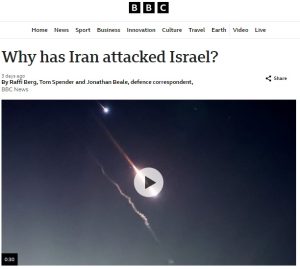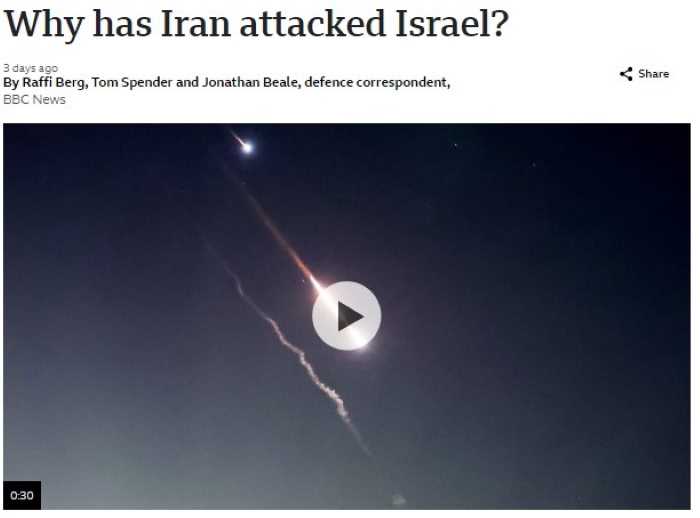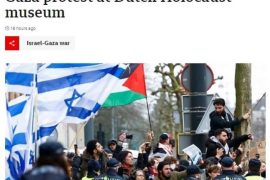Among the BBC News website’s coverage of the Islamic regime in Iran’s drone and missile attacks on Israel on the night of April 13th – 14th was a report by three BBC journalists: Raffi Berg, Tom Spender and defence correspondent Jonathan Beale.
Headlined “Why has Iran attacked Israel?” and published on April 14th, that report follows the template seen in many BBC reports since April 1st , unquestioningly promoting the claim that a building in Damascus in which IRGC-QF commanders and others were meeting when a strike took place was an Iranian “consulate”. [emphasis added]
“Iran launched drones and missiles towards Israel after vowing retaliation for a deadly strike on its consulate in the Syrian capital Damascus.
Israel has not said it carried out the consulate strike, but is widely believed to have been behind it.” […]
“Iran says Saturday night’s bombardment of Israel is a response to the 1 April air strike on an Iranian consulate building in the Syrian capital Damascus, which killed senior Iranian commanders.
Iran blames Israel for the air strike, which it saw as a violation of its sovereignty. Israel has not said it carried it out but is widely assumed to have done so.”
As has been the case in all the BBC’s related reporting, readers are not informed that the status of that building is under review by the US administration. Hence, Berg, Spender and Beale provide uncritical amplification for the Iranian regime’s narrative of ‘justification’ for its later attacks on Israel.
The report also promotes Iranian denials concerning its nuclear programme.
“Israel believes that Iran poses an existential threat as evidenced by Tehran’s rhetoric, its build-up of proxy forces sworn to Israel’s destruction, its funding and arming of Palestinian groups including Hamas and of the Lebanese Shia militant group Hezbollah, and what it believes is Iran’s secret pursuit of nuclear weapons, though Iran denies seeking to build a nuclear bomb.” […]
“Iran does not have nuclear weapons and also denies it is attempting to use its civilian nuclear programme to become a nuclear armed state.”
The writers chose to uncritically amplify Iranian excuses for its breaches of the JCPOA.
“Last year the global nuclear watchdog found uranium particles enriched to 83.7% purity – very close to weapons grade – at Iran’s underground Fordo site. Iran said “unintended fluctuations” in enrichment levels may have occurred.
Iran has been openly enriching uranium to 60% purity for more than two years in breach of a 2015 nuclear deal with world powers.”
Berg, Spender and Beale fail to inform readers that Hizballah attacked Israel on October 8th.
“Hezbollah in Lebanon is the most powerful of the armed groups Iran backs. It has been trading cross-border fire with Israel on an almost daily basis since war erupted between Israel and Hamas. Tens of thousands of civilians on both sides of the border have been forced to leave their homes.”
Their report states:
“Iran also provides weapons and training to Palestinian armed groups including Hamas, which attacked Israel on 7 October last year, sparking the current war in Gaza and the confrontations drawing in Iran, its proxies and Israel’s allies in the wider Middle East. However, Iran denies any role in the 7 October attack itself.”
Readers are not informed that Iranian sources have claimed that one of the IRGC commanders killed in the April 1st strike in Damascus was directly involved in the planning and execution of the October 7th attack or that – as recently revealed by The Times – there is evidence of Iranian financing of Hamas to the tune of hundreds of millions of dollars.
“According to the Times, the money, in cash, arrived from Iran to Beirut, where Islamic Revolutionary Guard Corps (IRGC) officers handed it over to Hamas.
Mentioned in the letters as the source of the funds is Saeed Izadi, referred to as Haj Ramadan. He runs the Palestinian division office in Iran’s Quds Force, one of five branches of the IRGC, and coordinates funding with Hamas, Islamic Jihad and other Palestinian terror groups.
His direct commander was Brig.-Gen. Mohammad Reza Zahedi, who was killed in the April 1 airstrike in Damascus.”
Berg, Spender and Beale conclude their report with promotion of a claim from a think tank employee:
“The strikes were certainly calibrated, directed to military installations with the aim of not inflicting too much damage or hurting anyone.”
In other words, these three BBC journalists would apparently have their readers believe that the Islamic regime in Iran somehow knew in advance that, in unprecedented operations, Israel and its allies were going to manage to intercept the hundreds of ballistic missiles, cruise missiles and suicide drones that it launched on the night of April 13th– 14th. Even a Sky News reporter was not persuaded by such entirely unevidenced claims:
“In a military base near the coast, we were shown the fuel tank for an Emad or ‘Pillar of Strength’ missile intercepted as it entered Israeli airspace that night.
It is 11 metres long, but with a warhead the size of a small car, it would have been even bigger at launch.
It has a range of 1,000 miles, a payload of half a tonne of explosives, is accurate to 10 metres and on Saturday was fired by the dozen at Israel.
Standing next to it, suddenly the claims that Iran’s attack was in any way a token effort or symbolic seem absurd.
If any one of those ballistic missiles had reached an Israeli population centre it would have been devastating.”
The absurd notion that the Iranian regime launched at least 170 attack drones, 30 cruise missiles and 120 ballistic missiles at Israel “with the aim of not inflicting too much damage or hurting anyone” has also been rejected by the United States and military experts.
Nevertheless, that is the takeaway message that these three BBC journalists sought to communicate to their readers worldwide.
Related Articles:
BBC REPORTING ON THE STRIKE ON IRCG OFFICERS IN DAMASCUS
BBC NEWS CONTINUES TO PROMOTE IRAN’S NARRATIVE ON DAMASCUS BUILDING
BBC NEWS WEBSITE COVERAGE OF IRANIAN REGIME ATTACK ON ISRAEL
BBC DEFENCE CORRESPONDENT: AL KIBAR WAS A ‘SUSPECTED’ NUCLEAR FACILITY






As forecast, the IPC (aka BBC) comes out with its defence of Iran’s illegal attack on Israel. Problem is that the “Religion of Peace” takes advantage of UK’s IDE tolerance to plant their activists in positions of power in the IPC, Government, Councils, Police, etc – so they influence more and more crucial decisions . The infidels are too naive to appreciate what is happening in front of their very eyes.